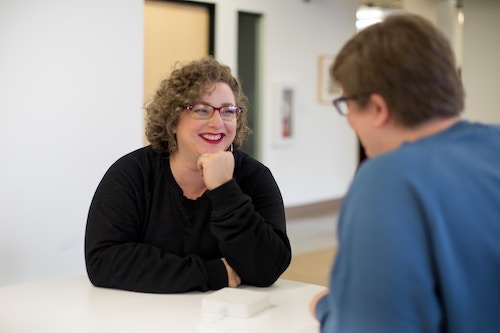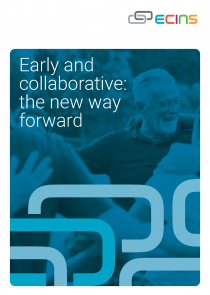Melton Mowbray’s Me & My Learning programme started in April 2014 and it initially targeted working age benefit claimants with the aim of supporting them in securing sustainable employment. At Me and My Learning over 20 primarily public and voluntary sector partners are co-located, and through an information sharing agreement provide a tailored programme to support individuals in becoming more digitally, financially and socially independent so they are better prepared for sustainable employment.
ECINS spoke to Dave McKenlay, Me and My Learning Business Partner at Melton Borough Council about the initiative:
HE: What are the Principles of the Me and My Learning Programme?
DMc: Me and My Learning is an approach, an ethos, rather than a process or set of instructions. It is designed to support people, irrespective of their age, to become more independent [with a consequential reduced demand on public services}.
HE: How does M&ML support partnership working?
DMc: Partners of the Me and My Learning (M&ML) programme work together at a location away from the main council hub, to deliver a holistic service that supports individuals on their
journey to independence. Through the M&ML model, Melton is able to reach a considerably larger cohort of people than those captured by the smaller, targeted focus of other national programmes such as Troubled Families.
The single location for the M&ML programme has supported better information sharing between partners around individual cases and we bring together a wide range of agencies and organisations including Job Centre Plus, Learn Direct, Local County Council Adult Learning Services, Princes Trust, Prospects, Remploy and Workpays. This approach has meant that citizens receive more consistent advice and information and can no longer “play off” one organisation against another.
From the start our approach to data sharing was very much “lets find a way of being able to do this’. We have information sharing agreements with our partners which allows us to give support to the whole person. The advantage of being co-located is that we can introduce them face to face and we get permission from individuals so they give informed consent.
HE: How does it work in practice for claimants?
DMc: It begins with an initial triage which is carried out when an individual presents, for any reason, at the Council or with one of our partner organisations – for example Jobcentre Plus. If, during that initial conversation, it is identified that there may be additional needs this is followed by a detailed needs assessment during which an individual personalised programme is agreed.
This identifies the barriers the individual faces, the interventions needed to address those barriers and the service providers who will help to do this. The approach focuses on employment being a key enabler in achieving and supporting independent living. Mentors work with individuals on a 1:1 basis helping them to progress through their agreed programme.
Referrals are made to a wide range of partner organisations (statutory, voluntary and private sector that operate within the Me and My Learning umbrella.
A key element of M&ML is that partner organisations are able to refer participants to other providers, if, in the course of their intervention they identify additional issues that need addressing.
Sharing information between M&ML partner organisations is critical to the success of the programme and consent forms are used to ensure that service users agree to this.
HE: Why do you think M&ML has been so successful?
DMc: Melton’s staff are able to confidently share information to build up the full picture for the client which enables our staff to provide a solution focussed approach, based on prevention, to identify interventions that aim to tackle the root cause of issues.
We have no set programme; we respond to people’s particular needs by tailoring our services to them as individuals. We primarily work with people who are a long way from the labour market and who have been through the process of work programmes with limited success. By co-ordinating a wide range of organisations under one umbrella we are helping the agencies to work together and helping individuals on an individual basis rather than just signposting them and keeping our fingers crossed. The extent and way in which we work with people is dependent on their particular needs and the level of support they need; if they need intensive support we will provide that as necessary.
The payback for us as a local authority is the more independent the individuals are the less they rely on our services which carries a clear cost benefit.
HE: How does ECINS help you achieve your aims on this project?
DMc: We got on board with ECINS after seeing how it was used at Derby City Council as part of the Universal Credit pilot. We worked closely with the ECINS team to develop it as our integrated case management system in order to get a better handle on the cases. ECINS allows us to actively manage people’s progress and journeys through Me and My Learning and also provide significantly more detailed and richer data than our previous spreadsheet based system.
At first, we kept quite tight control about who had access to ECINS but we are now rolling it out and incorporating our various partners on to the system. Our Caseworkers co-ordinate the activities between all our partner organisations including drug and alcohol teams, money advice and employment advisors and we actively work with these providers to monitor the individual’s progress across a whole range of issues. We use a Red, Amber, Green system to rate clients according to complexity and ECINS allows us to balance and manage the workload more efficiently.
HE: How successful has M&ML been so far for Melton?
DMc: This year has seen Me and My Learning continue to grow and develop and, most importantly, continue to make a real difference to the lives of people living in Melton.
During the year we have helped 56 people move into work (a total of 109 since M&ML started) and we have seen M&ML become an integral part of the way in which Melton Borough Council delivers its services. Our understanding of the people we help suggests that the majority of people that have moved into employment would not have done so without the support of Me and My Learning. We have also continued to move many more people nearer to work with around 300 training activities or qualifications being undertaken.
HE: How do you plan to continue and develop your use of ECINS and how do you plan to use the data you glean from the system?
DMc: A key reason for adopting ECINS as our case management system was to improve the data we capture and use it more intelligently.
We have continued to evolve our data collection and analysis and are now able, through ECINS to analyse a much wider range of data than before.
We have been monitoring data comparisons from this year to last year and have been able to draw some interesting conclusions. For example, this year we have learned that over 70% of people referred to M&ML were facing four or more issues at the point of their referral. These issues include teenage parents, family with a disabled parent, drug and alcohol problems to homelessness, debts and long term unemployment. We can drill down further into these statistics to get data on, for example, the types and levels of debt which helps us identify trends and solutions. This in turn enables us to identify, plan for and make informed decisions on spending, budgeting and commissioning for the future.
We are also working with ECINS to develop a data visualization tool that will allow us to look at locality level targets and present our data in a different way. We are keen to show that there is a cost benefit attached to giving organisations a shared target that everyone within one locality is concentrating their efforts on. By providing a holistic approach to solve individual’s problems and by working together with organisations many problems and issues can be prevented from escalating further. Melton knows that a single early intervention that prevents a situation from growing and escalating means current and future demand is reduced and savings are made across the whole system.
HE: What’s next for the M&ML Programme?
DMc: We will continue to develop Me and My Learning, including forging closer links with our local GP surgery and exploring the support we can provide to those in work but on a low wage.
The way we use ECINS will undoubtedly change as the programme grows and ECINS is able to bend and change accordingly. We set M&ML up to become part of how the council does business with its citizens, we are halfway down that road that the core elements of M&ML is now funded within the council, we do seek some additional funding but we no longer rely on ESF. Our long term goal is to make it an integral way of how the council does its business and to make cost savings from taking people off benefits and into employment.
We are constantly working to improve our information sharing so we can better understand our customers and ensure more accurate and timely delivery of preventative and early interventions.


